
September 14
1812 Napoleon enters Moscow:
One week after winning a bloody victory over the Russian army at the Battle of Borodino, Napoleon Bonaparte's Grande Armée enters the city of Moscow, only to find the population evacuated and the Russian army retreated again. Moscow was the goal of the invasion, but the deserted city held no czarist officials to sue for peace and no great stores of food or supplies to reward the French soldiers for their long march. Then, just after midnight, fires broke out across the city, apparently set by Russian patriots, leaving Napoleon's massive army with no means to survive the coming Russian winter.
In 1812, French Emperor Napoleon I was still at the height of his fortunes. The Peninsular War against Britain was a thorn in the side of his great European empire, but he was confident that his generals would soon triumph in Spain. All that remained to complete his "Continental System"—a unilateral European blockade designed to economically isolate Britain and force its subjugation—was the cooperation of Russia. After earlier conflict, Napoleon and Alexander I kept a tenuous peace, but the Russian czar was unwilling to submit to the Continental System, which was ruinous to the Russian economy. To intimidate Alexander, Napoleon massed his forces in Poland in the spring of 1812, but still the czar resisted.
On June 24, Napoleon ordered his Grande Armée, the largest European military force ever assembled to that date, into Russia. The enormous army featured more than 500,000 soldiers and staff and included contingents from Prussia, Austria, and other countries under the sway of the French empire. Napoleon's military successes lay in his ability to move his armies rapidly and strike quickly, but in the opening months of his Russian invasion he was forced to be content with a Russian army in perpetual retreat. The fleeing Russian forces adopted a "scorched earth" strategy, seizing or burning any supplies that the French might pillage from the countryside. Meanwhile, Napoleon's supply lines became overextended as he advanced deeper and deeper into the Russian expanse.
Many in the czarist government were critical of the Russian army's refusal to engage Napoleon in a direct confrontation. Under public pressure, Alexander named General Mikhail Kutuzov supreme commander in August, but the veteran of earlier defeats against Napoleon continued the retreat. Finally, Kutuzov agreed to halt at the town of Borodino, about 70 miles west of Moscow, and engage the French. The Russians built fortifications, and on September 7 the Grande Armée attacked. Napoleon was uncharacteristically cautious that day; he didn't try to outflank the Russians, and he declined to send much-needed reinforcements into the fray. The result was a bloody and narrow victory and another retreat by the Russian army.
Although disturbed by the progress of the campaign, Napoleon was sure that once Moscow was taken Alexander would be forced to capitulate. On September 14, the French entered a deserted Moscow. All but a few thousand of the city's 275,000 people were gone. Napoleon retired to a house on the outskirts of the city for the night, but two hours after midnight he was informed that a fire had broken out in the city. He went to the Kremlin, where he watched the flames continue to grow. Strange reports began to come in telling of Russians starting the fires and stoking the flames. Suddenly a fire broke out within the Kremlin, apparently set by a Russian military policeman who was immediately executed. With the firestorm spreading, Napoleon and his entourage were forced to flee down burning streets to Moscow's outskirts and narrowly avoided being asphyxiated. When the flames died down three days later, more than two-thirds of the city was destroyed.
In the aftermath of the calamity, Napoleon still hoped Alexander would ask for peace. In a letter to the czar he wrote: "My lord Brother. Beautiful, magical Moscow exists no more. How could you consign to destruction the loveliest city in the world, a city that has taken hundreds of years to build?" The fire was allegedly set on the orders of Moscow Governor-General Feodor Rostopchin; though Rostopchin later denied the charge. Alexander said the burning of Moscow "illuminated his soul," and he refused to negotiate with Napoleon.
After waiting a month for a surrender that never came, Napoleon was forced to lead his starving army out of the ruined city. Suddenly, Kutuzov's army appeared and gave battle on October 19 at Maloyaroslavets. The disintegrating Grande Armée was forced to abandon the fertile, southern route by which it hoped to retreat and proceed back along the ravaged path over which it had originally advanced. During the disastrous retreat, Napoleon's army suffered continual harassment from the merciless Russian army. Stalked by hunger, subzero temperatures, and the deadly lances of the Cossacks, the decimated army reached the Berezina River late in November, near the border with French-occupied Lithuania. However, the river was unexpectedly thawed, and the Russians had destroyed the bridges at Borisov.
Napoleon's engineers managed to construct two makeshift bridges at Studienka, and on November 26 the bulk of his army began to cross the river. On November 29, the Russians pressed from the east, and the French were forced to burn the bridges, leaving some 10,000 stragglers on the other side. The Russians largely abandoned their pursuit after that point, but thousands of French troops continued to succumb to hunger, exhaustion, and the cold. In December, Napoleon abandoned what remained of his army and raced back to Paris, where people were saying he had died and a general had led an unsuccessful coup. He traveled incognito across Europe with a few cohorts and reached the capital of his empire on December 18. Six days later, the Grande Armée finally escaped Russia, having suffered a loss of more than 400,000 men during the disastrous invasion.
With Europe emboldened by his catastrophic failure in Russia, an allied force rose up to defeat Napoleon in 1814. Exiled to the island of Elba, he escaped to France in early 1815 and raised a new army that enjoyed fleeting success before its crushing defeat at Waterloo in June 1815. Napoleon was then exiled to the remote island of Saint Helena, where he died six years later. (History.com)
[Note: the fate of the Grande Armée was very much in the thoughts of Hitler's generals when the Wehrmacht was pushed back to Berlin, initially in much the same conditions..—Ed.]
1886 Birth: Jan Masaryk: Czech foreign minister and diplomat: 1903 Marriage: Angela Hitler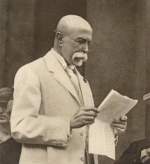

Paula Hitler
:Of my other brothers and sisters I especially remember my stepsister Angela as a beautiful girl. Also she was watched by my father very harshly. He was examining every wooer with the strict demand that only a civil servant was allowed to marry her. Really in 1903 she married the Revenue officer Leo Raubal in Linz, who died very young in 1910. After his death my sister with her 3 children went on to live in Linz for a short time. Then she removed to Vienna. Later on she married the university professor Hammitzsch in Dresden. They had no children.
Note: The union will produce Geli Raubal, who will commit suicide in Hitler's Munich apartment, and Leo Raubal, Jr., a Bavarian citizen who is the remaining relative of Hitler able to claim the rights to Mein Kampf, among other things. Leo, however, has no desire to make the claim, which would involve suing the Bavarian government, which now controls such rights. Even though the legacy is worth millions, Leo wants no part of it whatsoever. His final words on the subject are, "I just want to be left alone."
1911 Russia: Prime Minister Piotr Stolypin is assassinated
while watching an opera with the Czar in Kiev. The assassin, Dmitri Bogrov, is said to be a terrorist, but is later discovered to be a police agent.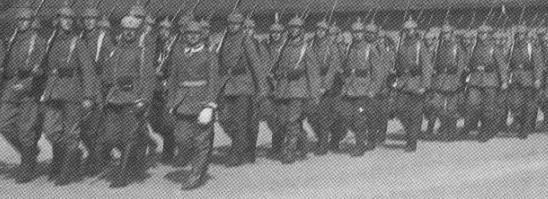
List Regiment
(Sep 1-Oct 7): Infantry Recruit Adolf Hitler's regiment begins a short but intensive basic training program, which is held in the premises of a large public school on the Elizabeth Platz in Munich. Hitler receives the first uniform of his life; basic greenish-grey with an "RIR 16" sown in red unto the epaulettes and a red stripe down the side of the trousers. The trousers are tucked into new leather boots, topped by a thick leather belt around the waist of the uniform jacket. [For further details, Click here.]
General Moltke
blamed for the failure at the Marne and with violating the Schlieffen Plan, is relieved by the Kaiser and ordered to report to Berlin. He is replaced by General Erich von Falkenhayn.The Battle of the Aisne - 'Eye Witness' Reports by Official British War Correspondent E. D. Swinton:
September 14th, the Germans were making a determined resistance along the River Aisne. Opposition, which it was at first thought might possibly be of a rearguard nature, not entailing material delay to our progress, developed and proved to be more serious than was anticipated. The action, now being fought by the Germans along their line, may, it is true, have been undertaken in order to gain time for some strategic operation or move, and may not be their main stand. But, if this is so, the fighting is naturally on a scale which as to extent of ground covered and duration of resistance, makes it undistinguishable in its progress from what is known as a "pitched battle," though the enemy certainly showed signs of considerable disorganization during the earlier days of their retirement phase. Whether it was originally intended by them to defend the position they took up as strenuously as they have done, or whether the delay, gained for them during the 12th and 13th by their artillery, has enabled them to develop their resistance and force their line to an extent not originally contemplated cannot be said.

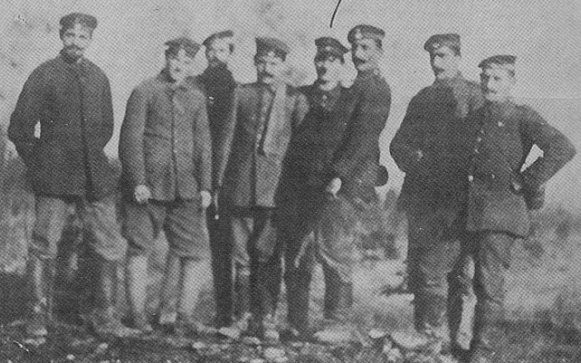
Hitler and his fellow dispatch runners
List Regiment:
Gefreiter Adolf Hitler endures trench warfare in Flanders (Artois) with 3 Company, 16 Reserve Infantry Regiment. [For further details, Click here.] Italian troops launch a short, concentrated attack on Austro-Hungarian positions on the Italian Front, near the Isonzo River.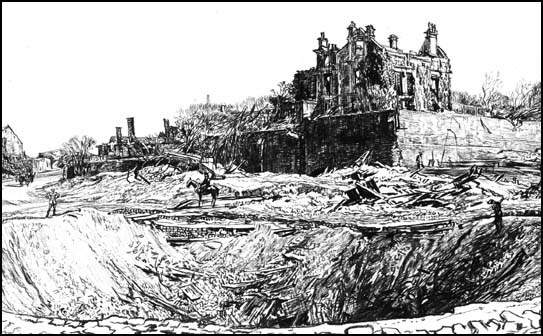
1918 World War I: Various:
Pershing's American forces continue their drive on the Saint-Mihiel salient:
The Germans at St. Mihiel undoubtedly did not know what was going on at first, and what they were expected to do, but we shall know more about it when they have been able to question prisoners more, and go over the battlefield more thoroughly. On the 3rd day, there was hardly anything done at all. From Hattonchatel one could see over the whole battlefield and behind it as far as Metz and Conflans there was not a sign of anything except some villages still burning. The Americans pushed up their patrols well up to the Yellow Exploitation Line. A constant stream of guns heavy and light, was moving up all that day and the night before. The American casualties were about 3,500 of which the number of killed was, I expect, about 100. I only saw in three days, about 20 dead Americans in all parts that I went to, but they expect there may be a good many in the woods where there was a certain amount of scrapping.
List Regiment: (August 21-September 27): Gefreiter Adolf Hitler attends a signals training course in Nuremberg. [For further details, Click here.] 1921 Weimar: Adolf Hitler
The mouth of Adolf Hitler always twisted when my name, Otto Ballerstedt, was mentioned. Numerous people told me so, and I knew anyway since Hitler had occasionally tried to interrupt me at some of my Bavarian League meetings as well as at general political rallies. One time he ended an outburst by asserting: "The Jews have woven an international spider web to trap vital resources for themselves and to ensnare anyone who wants to stop them." I at once opened my eyes and mouth so very wide, and said, "Well, Herr Hitler, my goodness, indeed. That sounds like an awfully fearsome predicament we're in. I've seen some rather unsightly spider webs, but none so gruesome as that conjured by you. And during numerous forays for facts, I've discussed many matters, international and political, with many men of note, and not one has ever reported a sighting such as yours, even in the metaphorical sense. I tell you, Herr Hitler, to those who worldwide number but several million, you attribute the most pervasive and astounding feats of financial and physical might. You must think each Jew possesses the capabilities of ten Aryans, or else how could you be so convinced they have the power to ruin us all?" Slurs and snickers flew at Hitler, and his mouth twisted even more.
1930 Weimar: The Nazis become Germany's second largest party: 1933 Netherlands: 1935 Abyssinia: 1936 Various:
Spanish Revolution: Hitler makes the closing speech at the Nuremberg Party Rally
These are only some of the grounds for the antagonisms which separate us from communism. I confess: these antagonisms cannot be bridged. Here are really two worlds that do but grow further apart from each other and can never unite. When in an English newspaper a Parliamentarian complains that we wish to divide Europe into two parts, then unfortunately we are bound to inform this Robinson Crusoe living on his happy British Island that - however unwelcome it may be - this division is already an accomplished fact . . . . . That one should refuse to see a thing does not mean that it is not there. For many a year in Germany I have been laughed to scorn as a prophet; for many a year my warnings and my prophecies were regarded as the illusions of a mind diseased.
Press Reaction to Hitler's September 14 Speech — The Times (London):
Against a background of marching troops and massed airplanes the fourth official rally of the National Socialist party will be brought to an end at Nuremberg today, and a murmur of relief will surely rise from the lips of all who hope and work for the pacification of Europe . . . . . Herr Hitler alternated between invocations of peace and a call to stand fast against the Russian terror, which must bring to many minds the former warnings of the ex-Kaiser against the Yellow peril . . . . From the Fuehrer himself downwards it has always been a stock theme of Nazi writings and oratory that Germany ought to have more territory to the East in which to hold her cramped population. The alarm of the two countries (France and Russia) and their determination to help each other is therefore wholly understandable.
1938 The Graf Zeppelin II 1939 World War II: German Ambassador in the Soviet Union Schulenburg to the German Foreign Office:
Molotov summoned me today at 4 p.m. and stated that the Red Army had reached a state of preparedness sooner than anticipated. Soviet action could therefore take place sooner than he had assumed at our last conversation (see my telegram No. 317 of September 10). For the political motivation of Soviet action (the collapse of Poland and protection of Russian "minorities") it was of the greatest importance not to take action until the governmental center of Poland, the city of Warsaw, had fallen. Molotov therefore asked that he be informed as nearly as possible as to when the capture of Warsaw could be counted on. Please send instructions. I would direct your attention to today's article in Pravda, carried by DNB, which will be followed by a similar article in Izvestia tomorrow. The articles serve [to prepare] the political motivation mentioned by Molotov for Soviet intervention.
1940 World War II: Various:
The Selective Service Act
Romania: A formal understanding between the Romanian Legionary Movement and General Ion Antonescu is sanctioned by King Michael and a National Legionary State is proclaimed. Ion Antonescu becomes President; Horia Sima, Vice President and Commandant of the Legionary Movement and Prince Michael Sturdza, Minister of Foreign Affairs.
Blitz: Daytime attacks on London are repeated again after two quieter days. The night attacks have been continuing without respite. The fighting goes well for the Luftwaffe with 14 planes lost on either side. With some justification it appears to the Luftwaffe leaders that the RAF is almost beaten. In Berlin, Hitler decides that Goering needs four or five consecutive days of fine weather to hammer home his advantage. Accordingly he defers his decision on the invasion once more, until September 17th, which in turn means that the invasion cannot take place until September 27.
1941 World War II: Various
Finland: Barbarossa: German forces complete the encirclement of two Soviet armies at Kiev.
North Africa: British naval forces fail in their attempt to achieve a landing at Tobruk.
1942 Various:
World War II: From a speech by Hitler Youth leader Baldur von Schirach before the European Youth Congress in Vienna:
Every Jew who exerts influence in Europe is a danger to European culture. If anyone reproaches me with having driven from this city, which was once the European metropolis of Jewry, tens of thousands upon tens of thousands of Jews into the ghetto of the East, I feel myself compelled to reply, 'I see in this an action contributing to European culture.'
[Assuming the justification for the death penalty at Nuremberg, I find it difficult to see why Schirach was awarded a prison sentence while Streicher, for example, was hanged.—Ed.]
Death: Ezra Seymour Gosney: American philanthropist and eugenicist: In 1928 he founded the Human Betterment Foundation (HBF) in Pasadena, California, with the stated aim "to foster and aid constructive and educational forces for the protection and betterment of the human family in body, mind, character, and citizenship," primarily through the advocacy of compulsory sterilization of the mentally ill and mentally retarded.
Stalingrad: Counterattacks by the Soviet forces fail to stop the advance toward the Stalingrad's inner city and the Central Station.
1943 World War II: Greece: British troops occupy the island of Leros in the Mediterranean.
1944 World War II: Various:
Baltics: War in the Pacific: Americans launch Operation Stalemate, at extraordinary cost:
On this day in 1944, the U.S. 1st Marine Division lands on the island of Peleliu, one of the Palau Islands in the Pacific, as part of a larger operation to provide support for Gen. Douglas MacArthur, who was preparing to invade the Philippines. The cost in American lives would prove historic.
The Palaus, part of the Caroline Islands, were among the mandated islands taken from Germany and given to Japan as one of the terms of the Treaty of Versailles at the close of World War I. The U.S. military lacked familiarity with the islands, and Adm. William Halsey argued against Operation Stalemate, which included the Army invasion of Morotai in the Dutch East Indies, believing that MacArthur would meet minimal resistance in the Philippines, therefore making this operation unnecessary, especially given the risks involved.
Peleliu was subject to pre-invasion bombardment, but it proved of little consequence. The Japanese defenders of the island were buried too deep in the jungle, and the target intelligence given the Americans was faulty. Upon landing, the Marines met little immediate resistance, but that was a ploy. Shortly thereafter, Japanese machine guns opened fire, knocking out more than two dozen landing craft. Japanese tanks and troops followed, as the startled 1st and 5th Marine regiments fought for their lives. Jungle caves disgorged even more Japanese soldiers. Within one week of the invasion, the Marines lost 4,000 men. By the time it was all over, that number would surpass 9,000. The Japanese lost more than 13,000 men. Flamethrowers and bombs finally subdued the island for the Americans, but it all proved pointless. MacArthur invaded the Philippines without need of Army or Marine protection from either Peleliu or Morotai. (History.com)
1946 Nuremberg Tribunal Edited by Levi Bookin (Copy editor) Click to join 3rdReichStudies Disclaimer: This site includes diverse and controversial materials—such as excerpts from the writings of racists and anti-Semites—so that its readers can learn the nature and extent of hate and anti-Semitic discourse. It is our sincere belief that only the informed citizen can prevail over the ignorance of Racialist "thought." Far from approving these writings, this site condemns racism in all of its forms and manifestations. 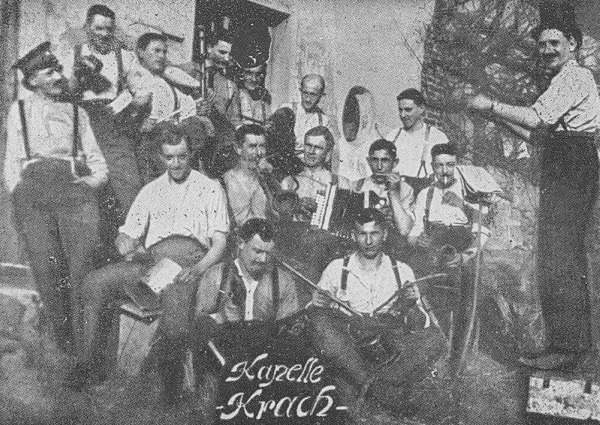
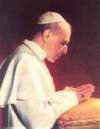
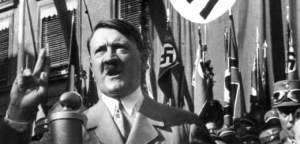
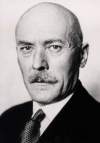
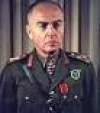
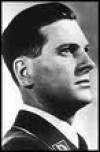
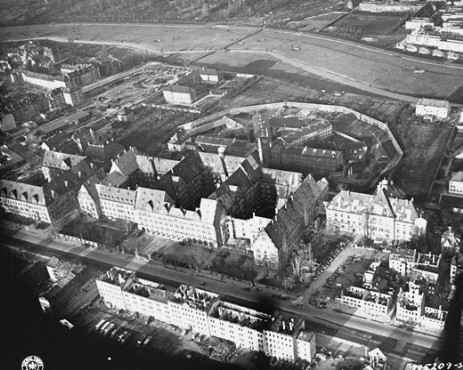
levi.bookin@gmail.com










Fair Use Notice: This site may contain copyrighted material the use of which has not always been specifically authorized by the copyright owner. We are making such material available in our efforts to advance understanding of historical, political, human rights, economic, democracy, scientific, environmental, and social justice issues, etc. We believe this constitutes a "fair use" of any such copyrighted material as provided for in section 107 of the US Copyright Law. In accordance with Title 17 U.S.C. Section 107, the material on this site is distributed without profit to those who have expressed a prior interest in receiving the included information for research and educational purposes. If you wish to use copyrighted material from this site for purposes of your own that go beyond 'fair use', you must obtain permission from the copyright owner.
Please Note: The list-owner and moderators of 3rdReichStudies are not responsible for, and do not necessarily approve of, the random ads placed on our pages by our web server. They are, unfortunately, the price one pays for a 'free' website.



